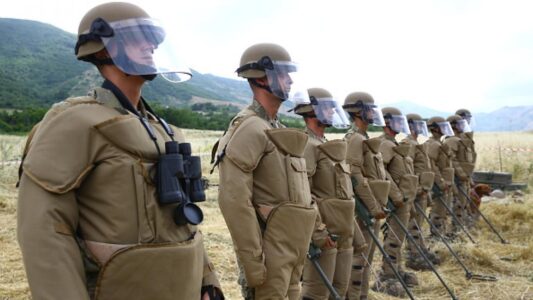
Armenia and Azerbaijan trade blame over armed border clashes
New clashes erupted between Azerbaijan and Armenia on Wednesday as international peace efforts intensified a day after the former Soviet republics saw their deadliest violence since 2020 in which hundreds have died.
Armenian Prime Minister Nikol Pashinyan told parliament that his small, landlocked country had appealed to the Moscow-led Collective Security Treaty Organization to help it restore its territorial integrity.
“If we say that Azerbaijan has carried out aggression against Armenia, it means that they have managed to establish control over some territories,” Russia’s Tass agency quoted him as saying.
Armenia and Azerbaijan have been fighting for decades over Nagorno-Karabakh, a mountainous enclave that is internationally recognised as part of Azerbaijan but was until 2020 populated and controlled by ethnic Armenians, with Yerevan’s backing.
Pashinyan said 105 Armenian service personnel had been killed since the attacks began, and that the spa town of Jermuk had been shelled. Armenia’s defence ministry, which has denied shelling Azerbaijani positions, said by 8 p.m. local time (1600 GMT) on Wednesday “the shooting has almost stopped in all directions”.
Tuesday’s violence, which Baku blamed on Yerevan, prompted an appeal for calm from Russian President Vladimir Putin and international calls for restraint. Azerbaijan made significant gains in and around Nagorno-Karabakh in a six-week war in 2020, partly thanks to weapons supplied by Turkey, a close ally.
Since then, skirmishes have erupted periodically despite a Russian-brokered ceasefire and tentative steps to reach a more comprehensive peace settlement. Turkish President Tayyip Erdogan said Armenia’s attitude towards Azerbaijan was unacceptable and would have consequences.
Domestic unhappiness in Armenia about the 2020 defeat has prompted repeated protests against Pashinyan, who dismissed reports he had signed a deal with Baku. In a Facebook post, he blamed the reports on “informational sabotage directed by unfriendly forces”.
A full-fledged conflict would risk dragging in Russia and Turkey, and destabilise an important corridor for oil and gas pipelines just as war in Ukraine disrupts energy supplies. Armenian Deputy Foreign Minister Paruyr Hovhannisyan told Reuters the clashes could escalate into a war – a second major armed conflict in the former Soviet Union while Russia’s military is focused on Ukraine.
Azerbaijan accused Armenia, which is in a military alliance with Moscow and home to a Russian military base, of shelling its army units. Baku reported 50 military deaths on the first day of fighting. Reuters was unable immediately to verify battlefield accounts from either side.
Diplomatic efforts
The flare-up has triggered international concern, with Russia, the United States, France and the European Union stepping up diplomatic efforts. Baku said Azerbaijani Foreign Minister Jeyhun Bayramov had met U.S. State Department Caucasus adviser Philip Reeker, telling him Armenia must withdraw from Azeri territory.
U.S. Secretary of State Antony Blinken on Tuesday said Russia could either “stir the pot” or use its influence to help “calm the waters”.
He held separate calls with Armenia’s Pashinyan and Azerbaijaini President Ilham Aliyev to urge a ceasefire. French Foreign Minister Catherine Colonna, in a call with her counterparts from both countries, also called for the “end of strikes against Armenian territory”.
EU Special Representative Toivo Klaar was due in the south Caucasus on Wednesday to facilitate dialogue. The CSTO also dispatched a delegation to assess the situation. In other strife involving ex-Soviet republics, Kyrgyz and Tajik border guards exchanged fire in Central Asia on Wednesday in a dispute over the course of their frontier, officials on both sides said.
Source: France 24





